9 Women Share How Fitness Helps Them Fight Their Chronic Illnesses

As an avid runner and marathoner, getting out for a daily sunrise run is just what I do. But it's not as simple as just waking up and scooting out the door a few minutes later.
Because I have Crohn's disease, an inflammatory bowel condition, I have to wake up at least an hour before I plan on running to use the bathroom—many times. Once that's mostly taken care of, I know my run will probably take twice as long as it should, because I'll likely have to make a handful of additional bathroom stops along the way. I have to plan my route based around the location and availability of public restrooms (or, uh, bushes and trees), and I can't wear anything tight because it will constrict my super-sensitive stomach.
But I keep lacing up my shoes and getting out the door—no matter how long it takes—because I refuse to let a chronic illness define my life. I want to be the one who defines my life, and I choose to define myself as a runner. Over the past 25 years, Crohn's disease has taken plenty from me—but I won't let it take away my precious miles.
Life with a chronic illness is hard, and when you live with one, many people are quick to tell you to "just rest" or "stop running." But for me, and for many others, breaking a sweat can actually be the best medicine. "Exercise is a wonder drug," says Shanna Levine, M.D., assistant clinical professor of medicine at the Icahn School of Medicine at Mount Sinai in New York City. "It's low-cost and can work almost immediately—so you owe it to yourself to get 30 minutes of moderate exercise a few times a week. Doctor's orders."
Here are nine more women who refuse to let their chronic illnesses hold them back—and who have found exercise to be the best coping mechanism when it comes to powering through the tough days.
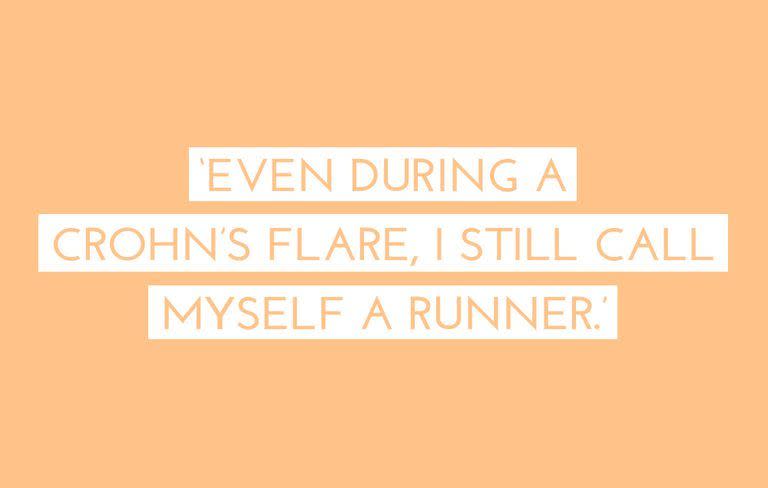
"On a day-to-day basis, even if I'm not in the midst of a flare-up, I generally have an unpredictable bathroom schedule. It's very variable, and acts independently, no matter my food, water, etc., intake. And when I'm flaring, the irregularity turns into hyper-regularity—meaning I need to be near a bathroom all day, every day. I also get canker sores all over my mouth, I have no appetite, I'm extremely fatigued, and the smell of food makes me incredibly nauseated. I'm forced to live my life in the exact opposite way than I prefer.
"Fitness has always been part of my life, but my forays into distance running and yoga came after I was diagnosed in 2009. Being a runner is one of my primary self-identifiers. It gives me confidence and gives me goals to work toward. It helps shape who I am outside of having Crohn's disease. It's easy to get entrenched in 'being' your disease, since it's such a prominent part of life, but by establishing myself as a runner, I've been able to define who I am on my own terms, in my own terms. Even during a flare, I still call myself a runner, even when I'm physically incapable of running from being too weak. I know at some point I'll be able to run again, and that gives me hope and excitement when life is otherwise, well, crappy. And when running is too aggravating for my stomach, yoga has been a phenomenal way for me to deal both physically and mentally with this disease. Beyond the physically gentle nature of practicing yoga, I've realized that the incorporation of deep breathing into my day does wonders for my mind and gut. There's something about being present and in tune with your breath that simultaneously relaxes and energizes me." —Robyn Mayer, 28, Crohn's disease
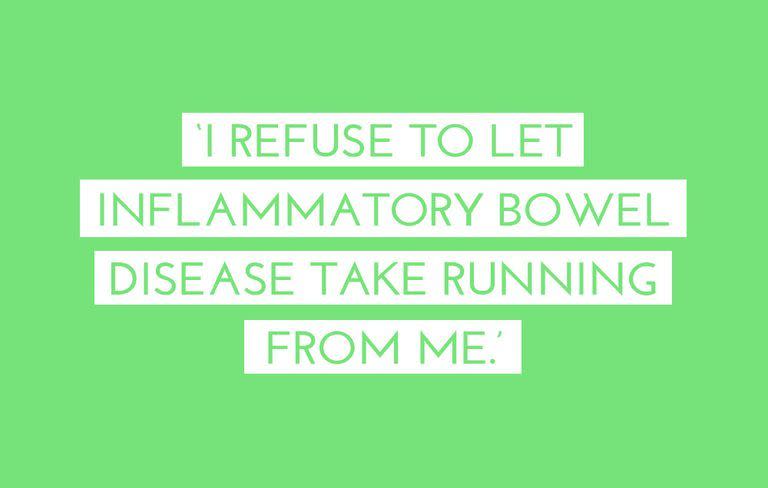
"I had been a runner for 20 years when I was diagnosed with ulcerative colitis, and had completed six marathons. But suddenly, I didn't know if I would be able to survive a five-mile run—or if I'd even be able to leave my apartment at any point throughout the day. I didn't know if running would be detrimental to my being able to keep the disease at bay, but my doctor said I could do as much as I felt I could do. He felt that me omitting that stress reliever from my life would actually do more harm than good. But I know that I feel stronger and better able to take on what life throws at me when I'm exercising and maintaining a healthy lifestyle as best I can. I know my limits, and I definitely push them, but I do it mostly out of defiance. I refuse to let an inflammatory bowel disease take running, something I love and is a huge part of me, away from me forever." —Abby Bales, 36, ulcerative colitis
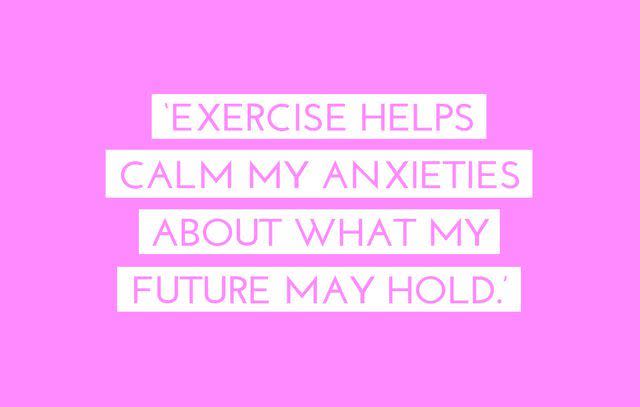
"Before I was diagnosed with mixed connective tissue disease in 2010, I wasn't active. The disease makes my body react strongly to weather conditions and the food I eat. If it's cold outside, I'm freezing. My hands change colors, and it's very difficult for me to warm up. If it's hot outside, I swell like Miss Piggy. I can feel the skin on my hands, legs, and feet expand, and I'm in a lot of discomfort and pain. The same swelling reaction happens with high-sodium foods. Mentally, this is a struggle because I'm very self-conscious about how my body is reacting to weather or foods, and I'm quite vocal about my discomfort. I'm a broken record, and I tend to get poked fun of by loved ones.
"But fitness has helped bring balance back into my life, physically and mentally. If I don't work out for more than two days, I can feel my body expand—which sounds weird, but it's the truth. My condition has been worsening a little more each year, but exercise helps calm any anxieties I have around what my future may hold. It also physically balances my swelling and any discomfort I may encounter." —Nina Morato, 31, mixed connective tissue disease
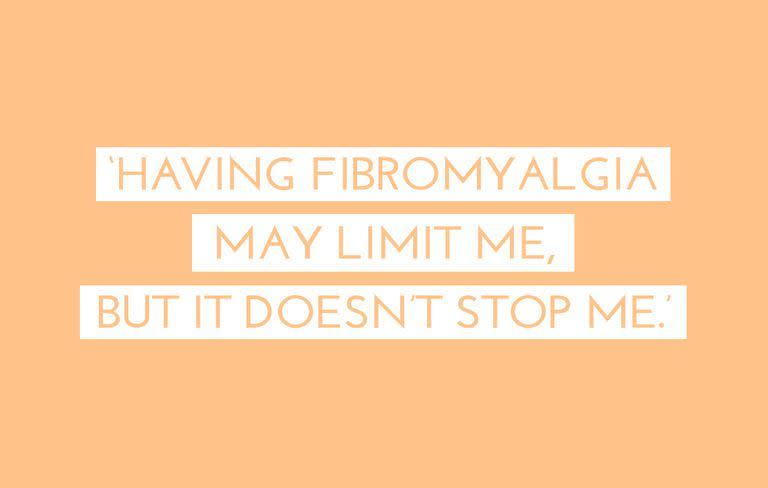
"This disease is hard because people don't think I look sick. But I suffer from pure exhaustion, I'm unable to sleep well, I get headaches and stomach issues, and I get total-body flu-like achiness. I often have to pass on fun things because I'm just too tired. But the doctor who diagnosed me told me that the fitter I was, the better I would feel. It took years for me to follow his advice, but he was right. Now, I've pushed myself so far physically—I recently completed a 50K race—but I've also learned to listen to my body. If I have to say no to something, it's not me giving up. It's me respecting my body. I still have bad days where getting up and out isn't an option, and that's okay. Mentally, I'm stronger because of it. At 42, I'm the fittest I've ever been in my life, and having fibromyalgia may limit me, but it doesn't stop me."
"Life with two chronic illnesses [rheumatoid arthritis and fibromyalgia] means I'm frequently drained and exhausted. I have insomnia and wake up a lot throughout the night, which means my body never really rests and recovers. So I don't sleep well, and then I wake up to spend the day continuing to use the same tired muscles—it's cyclical. During flares, it's a mental game of toughness, because it comes out of the blue. Since R.A. is an inflammatory disease, I can feel my joints swell and get tight, making it harder to move, and my internal organs swell as well, including my digestive tract and my heart. There are days that it's so hard to get going and start my day because I'm in chronic pain.
"Having a workout routine really helps keep my body moving, even when I'm sore and don't feel like getting out of bed. I know that moving the muscles and joints actually does them more good than harm. When I was diagnosed with R.A., my mother cried for me because she felt terrible thinking about how one day my body will attack itself to the point where I may not be able to move easily. So I'm taking the time now to strengthen my body to hopefully stave some of that off for just a bit longer. There will likely be a day when I can't hold a pen or twist a door handle, and will struggle to walk—but today is not that day, so I'll keep moving." —Melissa Mizell, 38, rheumatoid arthritis and fibromyalgia
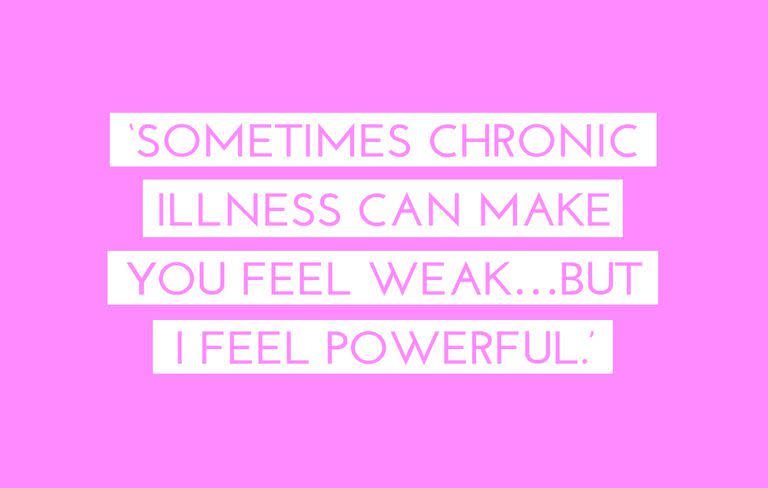
"It took years for me to get an accurate Lyme diagnosis. I struggle with fatigue, headaches, and migraines at least four times a week, hair loss, digestive distress, joint pain, and numbness in my hands and feet. Mentally, I have a lot of brain fog on some days, and my short-term memory is horrible. I can forget something while I'm doing it, or right after I'm done. Sometimes I feel like I can't think straight, and it's extremely frustrating.
"I've been active all my life, and haven't given it up on account of Lyme. When I was beginning to feel sick, I stopped working out as much because I was so tired, but eventually I picked it back up again because I missed it so much. Running lets me feel free, and often I feel so clear-minded on my runs that I can actually think. I have to really listen to my body, but running and cycling help me feel normal and strong, physically and mentally. Sometimes a chronic illness can make you feel weak and small, like you can't do anything. But as soon as I hit the trails, I feel powerful. All my life, fitness has taught me how to deal with pain and to push through it. Running taught me to never give up, and I've translated that mentality to dealing with Lyme, especially on my bad days. Now I'm training for a 57-mile charity run to raise money for Lyme awareness and advocacy." —Allison Donaghy, 27, Lyme disease (Follow Allison's journey at runningwhere.wordpress.com.)
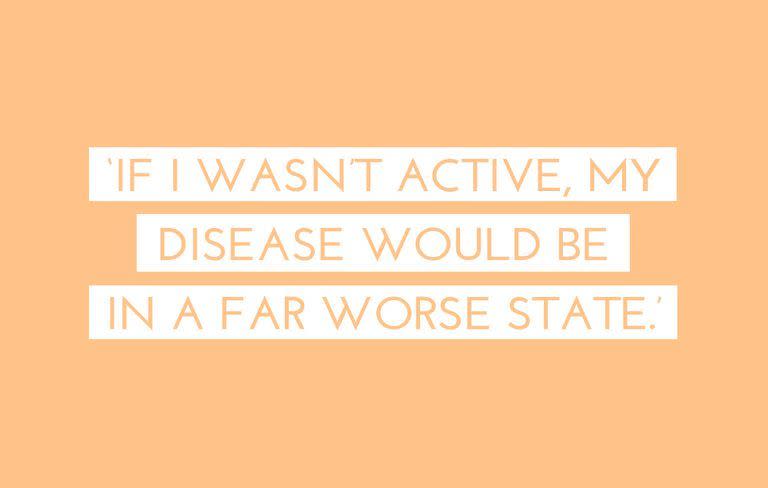
"My asthma is triggered by two things: being around smoke and sports. But since I was diagnosed when I was only 5 years old, I've actually been able to learn a lot about my body thanks to having asthma. I have to always be aware of my breathing, whether I'm working out or just going about my day, and I've learned to slow my breathing when it starts ramping up. Instead of avoiding active situations, I embrace them. Working out has always kept my lungs strong, and I'm confident that if I weren't active, my disease would be in a far worse state. I always take precautions to avoid attacks, because when they happen, they're downright terrifying. I know it's best for me to stay inside on super cold or humid days because the extreme weather can trigger an attack. But I don't quit—I just know how to listen to my breathing so I can keep going." —Alex Burke, 28, asthma
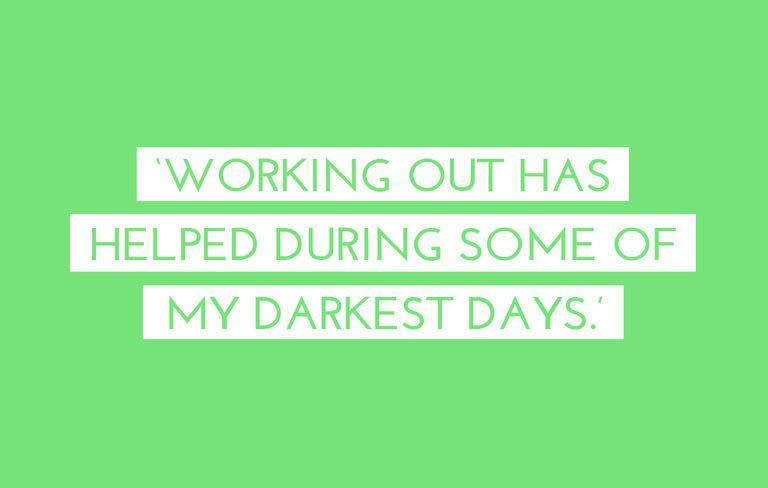
"All of my diseases sort of tie into each other. When I'm good, everything is good. But when one part fails, everything starts to crumble. Crohn's disease and anxiety are constantly tied together, and when I'm super anxious, my Crohn's will always flare. Then, when I get a flare-up, it will cause me to be anxious. My anxiety makes me depressed, and then this combination makes me unable to focus on anything, tying into the A.D.H.D. It's a terrible cycle, and it can be difficult to pull myself out of it.
"For my illnesses to be kept under control, I take a fair amount of medication—but those alone aren't sufficient. I've found that in order for me to keep my symptoms from surfacing, I need to watch what I eat and exercise regularly. Working out has helped me during some of my darkest days. I went through a rough period this past summer where nothing brought me joy and everything made me want to cry. The only relief I got was when I would get out and run. I would put all my focus into that run, for however long I was running that day. It was just me, my sneakers, and the road. There were some really difficult days that I don't think I would have escaped from without running. Elle Woods said it best: 'Exercise gives you endorphins. Endorphins make you happy. Happy people just don't kill...' And in this sense, the person I was thinking of killing was myself—but I'm still here. So thanks, running—and Elle Woods!" —Stacey Maya, 32, Crohn's disease, attention-deficit hyperactive disorder, depression, and anxiety
You Might Also Like

